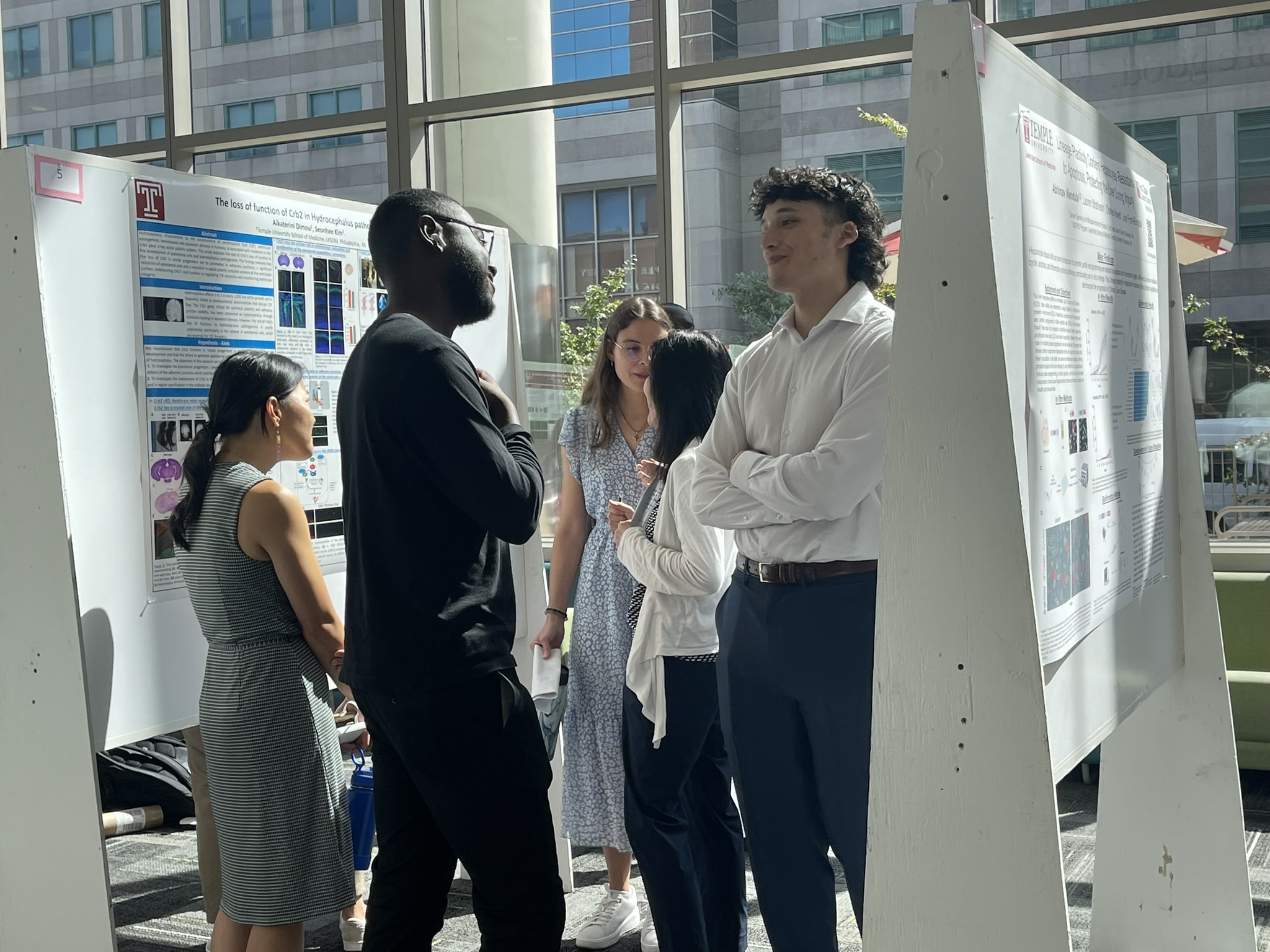Over the years, the Lewis Katz School of Medicine Dawn Marks Research Day, the centerpiece of the Biomedical Sciences Student Government’s calendar, has come to epitomize a number of important qualities. But they shouldn’t overshadow the original intent of the event, says Scott K. Shore, PhD, Associate Dean for Graduate and Postbaccalaureate Programs at Katz.
“Having a research day named after a successful female scientist is very important and beneficial,” he says.
The occasion gives PhD and MD/PhD candidates the opportunity to discuss their research with fellow students, faculty, and guests at large. Held August 28 in the Medical Education and Research Building, the 23rd annual edition featured 45 poster exhibitions and six oral presentations.
This platform was established in memory of Dawn Marks, PhD, a beloved Biochemistry professor. During her 31-year career at the Katz School, she served as Assistant Dean for Graduate Education (1984 to 1998) and coauthored a textbook that’s still widely used (and regularly updated): Basic Medical Biochemistry: A Clinical Approach.
Dr. Marks was revered by students for her commitment to them. She consistently made herself available, mentoring countless graduate students in the Department of Biochemistry, and she served on a variety of student advisory committees.
While the Biomedical Sciences Graduate Program handles some of the logistics, including arranging the catering and reserving the space, Dawn Marks Research Day is largely a student-run event. As student government president, Madison Honer, MS, a fourth-year PhD candidate, was responsible for much of the coordination, as well as overseeing a volunteer crew to help carry out the day.
The brunt of the planning began in June with the solicitation of abstracts and enlisting of faculty to serve as judges. Honer says she was able to observe the process last year as president-elect, which alleviated a lot of the stress that could accompany such responsibility. “I always knew what I needed to be doing and when it needed to be done,” she says.
Finely tuned as her schedule for the day was, Honer was still susceptible to the occasional bout of nervousness. That’s because in addition to all that was going on behind the scenes, she was also a first-time participant.
“One of the learning objectives of the program is effective communication, and this event certainly ticks that box in many ways,” Dr. Shore says. “Our program emphasizes oral communication as well as written, and the students have many opportunities for oral presentations, but usually not, at least internally, on the scale of what they’re able to do here.
“This is a chance for them to discuss their material at a different level,” he adds. “Speaking from a platform in a big room in front of 100 people or so can be intimidating. But having that experience provides them with valuable real-world experience in being able to communicate effectively.”
Dr. Shore says that what is unspoken, but widely acknowledged, is that the familiarity between the presenters and the audience can spark a little competitiveness, which only further helps hone those communication skills.
Honer, who works in the Whetstine Laboratory in the Cancer Epigenetics Institute at Fox Chase Cancer Center, delivered a poster presentation on her research, which is exploring epigenetic interventions for extrachromosomal DNA amplifications in various types of leukemia. Dr. Shore describes this type of presentation as “more of an intimate conversation” compared to the oral presentations that are done before a large audience.
Her primary takeaway from the experience was that “it was a safe space” for her to get “good feedback” from people both working within her field and outside of it.
In a unique twist, new doctoral students in the Biomedical Sciences Graduate Program, who began only two days earlier, were charged with serving as poster presentation judges during Dawn Marks Research Day. Dr. Shore says it’s a “great way” for them to start informally interacting with their peers. He also believes the experience helps set their expectations at an impressionable moment.
“They’re seeing firsthand the level of science the students here are doing,” he says. “And that tells them that they’re in for a rigorous program, where the science and subject matter are sophisticated and on par with — or even better – than the other schools they may have interviewed with.”
Announcing the Winners
An important aspect of Dawn Marks Research Day is introducing students to scientific competition. Every year, awards are given to trainees in three categories. A faculty member who best represents the ideals of Dr. Marks is also honored. This year’s winners are as follows:
POSTER EXHIBITIONS
Years 1-3
1st Place: Katerina Dimou, 3rd year, Kim Lab (Lewis Katz School of Medicine)
2nd Place: (Tie) Abhinav Illendula, 2nd Year MD/PhD, Font-Burgada Lab (Fox Chase Cancer Center) and Jade Wilson, 3rd Year MD/PhD, Whetstine lab (Fox Chase Cancer Center)
3rd Place: Aidan Douglas 2nd Year, Estaras Lab (Lewis Katz School of Medicine)
Years 4+
1st Place: (Tie) David Glass, 4th year, Johnson Lab (Fox Chase Cancer Center) and Nadina Latchman, 7th year, Elrod Lab (Lewis Katz School of Medicine)
2nd Place: Xiaotian Zhang, 5th year, Thomas Lab (Lewis Katz School of Medicine)
3rd Place: Delia Zumpano, 4th year, Rink Lab (Fox Chase Cancer Center)
ORAL PRESENTATIONS
Esteban Delgado, 3rd Year, Liu Lab (Lewis Katz School of Medicine)
Angela Rocchi, 4th Year MD/PhD, Khahili Lab (Lewis Katz School of Medicine)
GRAPHICAL ABSTRACT
Esteban Delgado, 3rd Year, Liu Lab
DAWN MARKS, PHD, FACULTY TEACHING AWARD
Silvia Fossatti, PhD, Interim Director and Associate Professor, Alzheimer's Center at Temple; Associate Professor, Neural Sciences; Associate Professor, Cardiovascular Sciences; Associate Professor, Lemole Center for Integrated Lymphatics and Vascular Research

